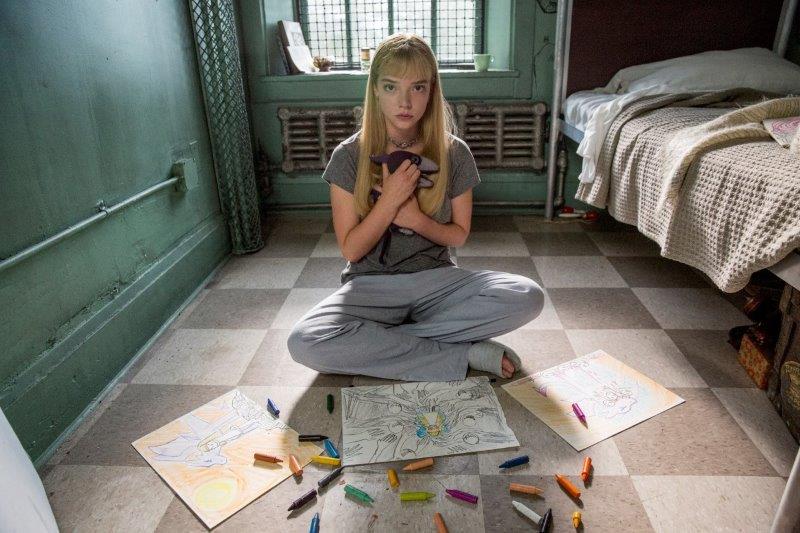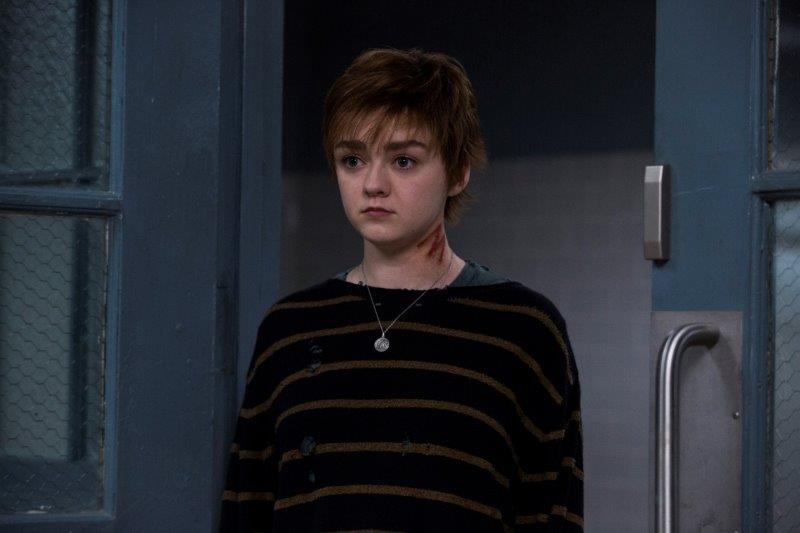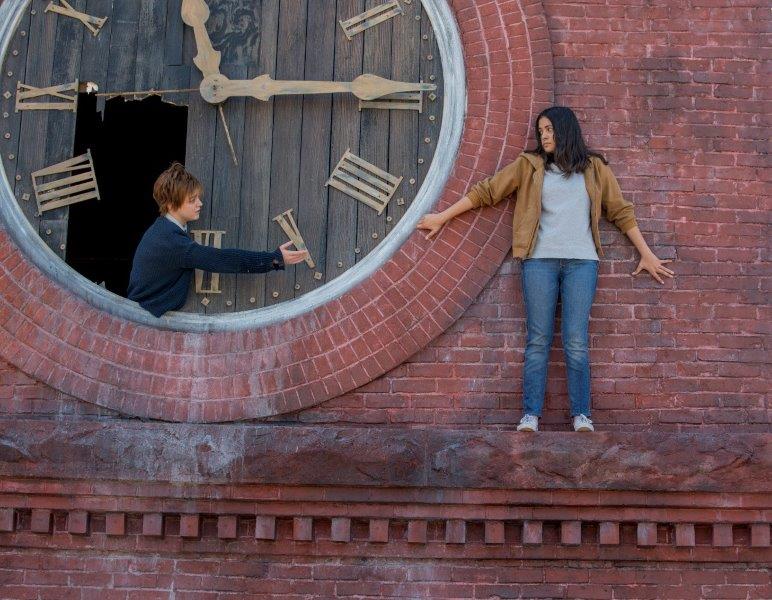by Gill Pringle
Speaking with director Josh Boone and the cast – Maisie Williams (Rahne Sinclair), Charlie Heaton (Sam Guthrie), Anya Taylor-Joy (Illyana Rasputin), Blu Hunt (Dani Moonstar), Henry Zaga (Roberto da Costa) and Alice Braga (Dr Reyes), who reassure us why it has been worth the wait.
So, this is the first horror thriller set in Marvel’s X-Men Universe. It’s also one of the first big studio films to come out after months and months of quarantine, and it’s about people trapped somewhere that they can’t get out of. So . . .?
ALICE: How timely. I think people are gonna connect more with the characters’ feelings than ever.
ANYA: I hadn’t thought about it that way before, but it makes perfect sense now. I feel like the movie’s supposed to come out now. I think people will see it in a very different way.

And you filmed in a spooky abandoned old mental asylum. How did the set inform the horror aspects of this superhero film?
ANYA: The setting really helped with that, because it did feel like we were kind of in a high school/college experience. We were all going to the same place every single day, and then going back to, like, dorms.
JOSH: It was like a college experience, but on a set where somebody had hung themselves maybe 40 years before . . .
HENRY: It also felt like quarantine. We were quarantining in a hotel all together.

And you all stayed in the same hotel while filming which isn’t always the case. When you think back on the experience of all that time you spent together, what sticks out to you the most?
CHARLIE: The togetherness. I mean, you have no choice but to hang out – and it’s a long period of time as well, like three months in all. And there is really nothing, I mean, sorry Norwood [Massachusetts], but there’s not a lot to do in Norwood. So, to tie in with the film, it really made us bond and learn about each other like these characters do. It was life meeting art, which was nice.
JOSH: In the movie, Blu comes to this institution and makes everybody, through her powers, open up. So, I guess that’s sort of the same thing that happened when we made the film and everybody became friends.

Alice, you’re really the only adult in this film?
ALICE: Yes, and I make notes about my relationship with each one of them. I think with each one of them, (Dr. Reyes) needs to learn how to read them and, in a way, dominate them because, while she is the supervisor of this facility, she is also a mother figure to them. These kids go through their teenage moments, questioning themselves and who they are, while also trying to figure out what it means to be a mutant. It’s a unique portrayal of superheroes because they are not perfect or untouchable; they are kind of broken and feel shame and lack self-acceptance. It’s quite relatable.

Anya, as Russian-born Ilyana Rasputin your character has developed a real love-hate relationship with this secret institution?
ANYA: Illyana is the one that has been there the longest. She feels like she is really stuck there, and I think that creates a warped reality for her within the hospital. On the one hand, she hates being locked up. But on the other hand, she has a bed and she is safe. When Dani arrives, it really upsets her hierarchy within the facility because, in her mind, they are all pretty scared of her, which is the way that she likes it. But when Dani enters the equation, it starts messing with all of those relationships… Dani is empathetic and starts questioning things, whereas Illyana is more action forward and is very hardened by the world. Playing opposite Blu was really interesting, because their characters have completely clashing ideologies.

Maisie, can you talk about becoming a wolf?
MAISIE: Rahne is far more used to her powers than some of the others. There are actually times when she prefers being a wolf… she grew up in a repressed environment with a lot of shame about who and what she is, so now she has come to this hospital where it’s encouraged to embrace who you are, so she spends a lot more time as a wolf than she does a human. When she is in human form, she is quite awkward and doesn’t know how to interact with the other teenagers. She’s never really been outspoken, and I think that stops her from flourishing. When she meets Dani, she feels like she can really be herself.

Charlie, what can you tell us about country boy, Sam Guthrie?
CHARLIE: This is an origin story and we start at the beginning with these characters in a facility. And they are all very damaged, Sam especially, from an incident in the coal mine which was the first time that he discovered his power. I kind of interpreted it as him having a panic attack in the mines because he was claustrophobic and getting scared. His power came out of that panic attack, and usually he can project into the sky, but in the mine, his energy caused a huge explosion and he killed his family and most of the people that he knew in this small Kentucky town.
Being a Brit, was it hard to find Sam’s accent?
CHARLIE: I do a lot of American work but to be honest, I was pretty nervous about the Southern accent and would it be so specific? You really want to get that right. It’s really important to me playing a character with the accent, that it’s got to be right, so I did some dialogue sessions with some coaches and then I got all these tapes of police officers from Kentucky doing long interviews and spent so much time working on that. I also got a little digital radio so I could listen to radio stations in Kentucky. So much for me about accents is listening and really hearing how they talk and what they mean when they say words. It’s more than doing the voice, it’s what makes them a person.

As the latest addition to the hospital, Danielle Moonstar doesn’t feel as if she belongs to this group in the first place. Is that right Blu?
BLU: I don’t think Dani believes she is a mutant. It’s only in the hospital where she realises for the first time that there is something different about her.
Dani and Rahne’s budding romance offers a rare LGBTQ storyline. Can you tell us about your connection, not only as characters, but as actors? Tell us about your screen test?
MAISIE: Yeah, we met maybe two or three months before we shot the film. I’d done a couple of screen tests before, but this was the first time that I had to kiss a stranger in the screen test, which is a nerve-wracking experience. . .
JOSH: Pre-COVID! And it was probably strange the way we did it. I had them lay down on the floor together, like, as if they were looking up at the stars like they are in the movie and did a two-shot of them. So, we did really act that scene out the way that we did when we shot it.
BLU: I was nervous.
JOSH: Did you guys feel a little magic when you kissed?
BLU: I think I knew I got the part as soon as we kissed. I was like, that was real.
JOSH: You’re like, if they made me kiss Maisie, I know I got the part?
BLU: No, it was definitely a really crazy feeling. I’d watched Maisie’s show [Game of Thrones] and I was like going to this audition all the way across town. And I couldn’t believe that I was even there when it was happening. But then the whole relationship between our characters and then us as friends on set, was really amazing. It really got me through making the movie. Our character relationship was really important to me. It was probably my favourite part of Dani, honestly, her relationship with Rahne.

What are you most excited for audiences to see?
JOSH: Well, yes, all the cool visual effects and the big fights at the end and all that. But, just seeing these two girls under that dome looking up, I think, is really cool to see people do in a movie. I’m excited for that stuff just as much as the action and the Marvel stuff and all that.
For the actors, is there anything that you’ve continued to learn or come to realise about your character during this longer than usual period for the production to release?
BLU: It’s actually really weird, because I feel like I did realise a lot of things about Dani, my character, after filming. I definitely realised how close I was to her as a person, which I didn’t really realise while I was filming. And then when I left and was able to look back at it and think about Dani, it suddenly all came to me. And I was like, oh my God, me and Dani are really the same person, which is kind of weird, because I think usually you feel like you get to play a character. So, I think it was very strange for me to play someone that was so much like me. That wasn’t something I realised until a lot of time passed. But three years have passed since making the movie, and I’ve definitely grown as an actor, and as a person. And, if I would play Dani three years later again, I think it would be interesting because I feel like she would still be just like me, and she would have come into her body for the first time. Like, I think she’s a very uncomfortable teenager. I was probably uncomfortable then, but now I’m not at all.
Would you want to play her again?
BLU: Yeah, of course. She was the first real character I ever got to play and she’s really close to my heart so it would be really fun to play her again as an adult. Dani as an adult now and not a teenager. Maybe her powers aren’t all negative and bad. Maybe she can make some dreams come true and not just nightmares.
Does anyone else have any realisations they had about their characters after the fact?
MAISIE: Yeah, I think at the time, we were all a lot younger. And it’s only three years, but I feel like at this time in our lives, you just do change a lot. And, at the time, I was just very uncomfortable when I was playing Rahne, and wearing the wig and tatty clothes. It’s hard to do your job right when you feel unattractive, like, you can’t get your ego out of the way. So, looking back now, that was actually perfect – to feel that way and to feel uncomfortable in the clothes because that’s who she is and she isn’t born with every ounce of confidence. So, it was something I was really fighting at the time, but actually looking back, being so uncomfortable really works for the role.
As the only adult in the group, how do you think teenagers will react to this film?
ALICE: It was really interesting to see their work because when you read the script or see the story, you can see how many teenagers are gonna connect with each one of them in different ways. Maybe someone is gonna connect more to Maisie’s character. Someone is gonna connect more with Charlie’s character or Anya’s, because I think the movie talks about injustice in a brilliant way; it also talks a lot about young people and going through their lives, being mutant or not. And the X-Men has always been a metaphor for talking about acceptance. And teenagers, they go through that. I think a lot of people who see the film either are going to remember how they were themselves, or they’re going to see themselves if they are around that age. I think the movie’s really cool because it really goes deep into these kids; young adults that are figuring out life and going through these feelings, and understanding their bodies and their role in the world. So, I think it’s really nice to have an action film that’s entertaining but also deals with these kinds of situations in a nice way.
JOSH: It’s definitely more character driven and driven by performance than typical movies in this genre.
HENRY: I also relate to this discomfort that Maisie talks about. I think all of our characters have some sort of physical discomfort, coming either from our powers or just from growing pains. But you know, like we were talking about before, the love for these characters… I was feeling like I have to live up to a role and I should have used that fear, that insecurity for Roberto, because he is trying to live up to a facade, to pretend to be a confident 17-year old who’s actually just craving love and is really sensitive. He just can’t face that because it causes so much pain. So, I think we can all relate to that discomfort.

Josh – can you talk about your love for Chris Claremont and Bill Sienkiewicz’s demon bear storyline from the comics – and why that was the right story to adapt and bring these characters to the big screen?
JOSH: I wrote this with my very best friend in the world (Knate Lee). We’ve known each other since we were little babies. Our moms are best friends. And we grew up in the 1980s reading Marvel Comics, and I still vividly remember to this day seeing the covers of the New Mutants comics that Bill [Sienkiewicz] started working on; these Demon Bear ones, because they did not look like any comic book covers I’d ever seen before. They were painted, they were impressionistic, they had a more slippery surreal look than typical comic books. They really captured my imagination, and I thought about them for years. I remember being in L.A. when I first moved out, in an apartment, 10 years before I even made a movie. I had a stack of New Mutants comics, and then I was lucky enough to have made a movie for Fox that was successful (The Fault in Our Stars), and I went and begged them to let us take a crack at these comics we liked when we were young. Almost all projects that I ever do, they go back to my childhood or back to things that I feel real passionate about and love, because that’s really all that can sustain you through how long it takes to make something, get it made, shoot it, write it, edit it. So, we try to pick things that we have deep, passionate feelings for, to hopefully connect to childhood because those are the things we’ll stay passionate about.
The New Mutants opens in participating Australian cinemas September 3, 2020 (excluding VIC)



